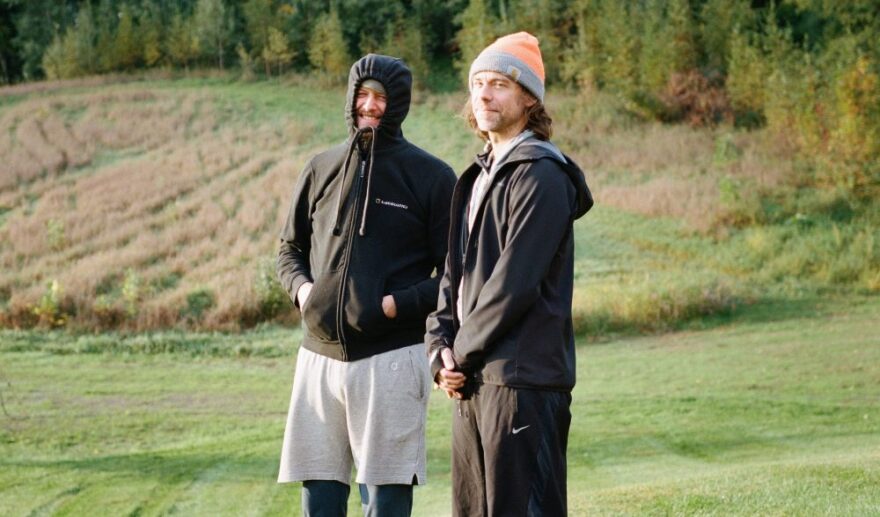For a guy who seems happiest hiding behind layers of melancholy guitar and someone else’s vocals, Aaron Dessner sure has a lot to say. Calling in from France—wine in hand, delivered by his daughter, no less—the National’s resident sonic architect is in peak reflective mode. He’s talking about Big Red Machine, that open-door musical commune he runs with Bon Iver’s Justin Vernon, and how the sophomore album, How Long Do You Think It’s Gonna Last?, became more therapy session than side project.
“The whole idea of Big Red Machine,” Dessner says, swirling his wine like someone who actually knows how to, “was always to be a community of voices.” The first record might have felt like a Justin Vernon solo album to the casual ear, but Dessner insists it wasn’t supposed to be that way. “It’s almost like a band, but the windows and the doors are wide open,” he says. “Anybody and everybody should pass through.”
And pass through they did. This time around, the guest list reads like a who’s who of indie cool: Sharon Van Etten, Lisa Hannigan, Anaïs Mitchell, and yes, Taylor Swift—because in 2021, what’s a folk-adjacent record without a touch of Swiftian myth-building?
But let’s not pretend Dessner’s entirely comfortable with all the attention. Even when he’s the one singing, as on “The Ghost of Cincinnati,” a song he describes as “simultaneously about myself and about… other relatives or friends,” he’s still half-ghost, wandering familiar streets unseen. The song, inspired by a screenplay from filmmaker Nicole Riegel, taps into a lifetime of memories—and ghosts—lurking in his Ohio hometown. “When someone’s really overextended to the point where they’re almost empty, like a ghost, wandering around… looking at people that knew them but they can’t see them anymore,” he explains.
Dessner’s no stranger to these darker corners. “I’ve struggled with depression myself,” he says. “Most people I know intimately have had one form of mental health struggle or another.” This isn’t an album that dabbles in the theme—it practically bathes in it. There’s a song called “Hutch,” a tribute to the late Scott Hutchison of Frightened Rabbit, whose suicide left a crater in the indie rock community. “Did I miss clues?” Dessner asks aloud, still clearly haunted. “Did I not ask how he was doing enough?”
Big Red Machine, it turns out, is a place for Dessner to ask those questions, to find some kind of catharsis—or at least company. “It’s not the easiest type of record to make,” he admits, laughing about the sheer logistics of blending so many voices without it sounding like a Spotify playlist gone rogue. “But we got to this place where it feels like there’s many characters in this book, but they’re all singing about similar things.”
Then there’s Swift, seamlessly stepping into this misfit choir. “She found Big Red Machine inspiring and she’d become part of our community,” Dessner shrugs. No big deal. Just another day in the Dessnerverse. “One day she just wrote ‘Renegade’ and sent it to me.” He makes it sound like she dropped off a casserole.
Despite the occasional A-lister cameo, Dessner insists Big Red Machine is still just a group of friends making music. Touring? Not likely. “I don’t think there’ll ever be a real tour,” he says, though he floats the idea of a one-off show, “if we could all just show up and play all the songs.” The words sound dreamy, but don’t hold your breath.
And what about The National? Is the gloomy juggernaut of indie rock done brooding? “I feel certain that The National will rise again,” Dessner says, sounding more like a medieval prophecy than a man talking about his band. “But it’s been good to have a break. A reset.”
Still, he admits, “It’s weird not to have played the songs in so long. I don’t know if I’m going to remember how to play them.” Maybe that’s not such a bad thing. Maybe forgetting is part of moving forward.
And moving forward, for Dessner, means more singing—maybe. “I’ll try not to hide out so much,” he offers, half-promise, half-apology. “I’m not going to be some great singer all of a sudden, but I’ll pipe up when I have an idea.”
Here’s hoping he keeps piping up. Even ghosts have something to say.
Watch the interview above and then check out the videos below:


